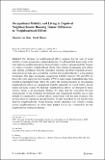Occupational mobility and living in deprived neighbourhoods : housing tenure differences in ‘neighbourhood effects’
Abstract
The literature on neighbourhood effects suggests that the lack of social mobility of some groups has a spatial dimension. It is thought that those living in the most deprived neighbourhoods are the least likely to achieve upward mobility because of a range of negative neighbourhood effects. Most studies investigating such effects only identify correlations between individual outcomes and their residential environment and do not take into account that selection into neighbourhoods is a non-random mechanism. This paper investigates occupational mobility between 1991 and 2001 for those who were employed in Scotland in 1991 by using unique longitudinal data from Scottish Longitudinal Study (SLS). We add to the existing literature by investigating neighbourhood effects on occupational mobility separately for social renters, private renters and home owners. We find that ‘neighbourhood effects’ are strongest for home owners, which is an unexpected finding. We argue that the correlation between characteristics of the residential environment and occupational mobility can at least partially be explained by selection effects: homeowners with the least resources, who are least likely to experience upward mobility, are also most likely to sort into the most deprived neighbourhoods. Social housing tenants experience less selective sorting across neighbourhoods as other than market forces are responsible for the neighbourhood sorting mechanism.
Citation
Van Ham , M & Manley , D 2015 , ' Occupational mobility and living in deprived neighbourhoods : housing tenure differences in ‘neighbourhood effects’ ' , Applied Spatial Analysis and Policy , vol. 8 , no. 4 , pp. 309-324 . https://doi.org/10.1007/s12061-014-9126-y
Publication
Applied Spatial Analysis and Policy
Status
Peer reviewed
ISSN
1874-463XType
Journal article
Description
This research was funded by the European Research Council under the European Union's Seventh Framework Programme (FP/2007-2013) / ERC Grant Agreement n. 615159 (ERC Consolidator Grant DEPRIVEDHOODS, Socio-spatial inequality, deprived neighbourhoods, and neighbourhood effects). The authors also acknowledge the Marie Curie programme under the European Union's Seventh Framework Programme (FP/2007-2013) / Career Integration Grant n. PCIG10-GA-2011-303728 (CIG Grant NBHCHOICE, Neighbourhood choice, neighbourhood sorting, and neighbourhood effects).Collections
Items in the St Andrews Research Repository are protected by copyright, with all rights reserved, unless otherwise indicated.

